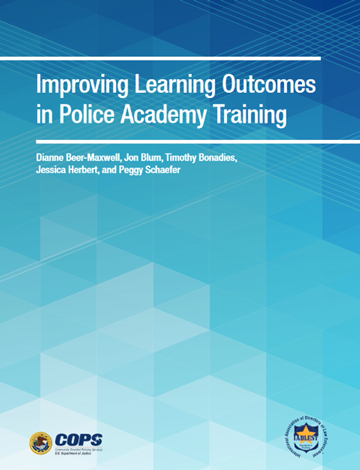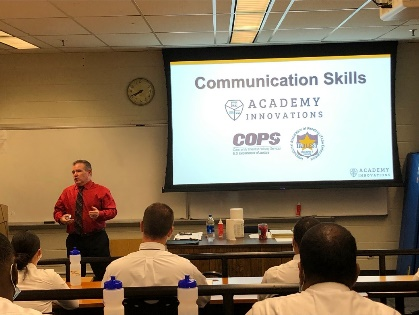Project Results (November 30, 2023)
Results for this study have just been published, and are sure to be of interest to Academy Directors as well as those involved in curriculum design.
See the results below:
The Academy Innovations research project is supported by the U.S. Department of Justice COPS Office. The project is designed to develop evidence-based training methods for the law enforcement industry. The goal is to identify improved methodologies for delivering entry-level law enforcement training content.
Problem
A recruits’ ability to learn and retain information presented during and after a basic police academy is a genuine concern for academy directors, police administrators, recruits, officers, and the community. Because much information is delivered relatively quickly, police training professionals must understand and employ instructional delivery methodologies that help recruits learn and retain information.
Research Program
From 2020 to 2023, IADLEST managed the Academy Innovations project, a COPS Office-supported initiative aimed at studying ways to improve methodologies for delivering entry-level police academy training content. The project conducted a randomized controlled trial (RCT) in five U.S. police academies to determine if students who participated in an in-person or online integrated curriculum performed better than those who participated in an in-person or online traditional siloed lecture. This first of its kind research aimed to answer two questions:
- Does frequency of instruction on a topic (integrated into the curriculum at specific intervals) impact knowledge retention?
- What impact does online instruction have on knowledge retention (positively or negatively) compared to traditional classroom delivery?
On November 30, 2023, the COPS Office published the final report for the Academy Innovations project. The report briefly reviews the literature on integrated curricula and retention intervals, discusses the results of the study and implications for the field, and provides eight best practices to guide the implementation of integrated curriculum elements in the police academy.
Project Results
Practitioner's Guidebook from the COPS Office:
Improving Learning Outcomes in Police Academy Training

Additional Publications and Presentations
Project Related Resources
Academy Innovations Curriculum
The below files are the curricula and integrated curriculum the team used during the study. The study was not designed to test and validate the curriculum, rather the instructional methodology. These files are provided as a resource for the field and serve as an example of how a topic can be integrated throughout an academy curriculum.
Each of the zipped files below contain Instructor's Guide, Student's Guide, PowerPoint Presentation, Handouts, and Practical Exercises Directions:
Communications Skills Documents (37MB)
Persons in Crisis Communications Documents (4MB)
Motor Vehicle Stops Communications Documents (7MB)
References and Resources

The project team includes: Peggy Schaefer, Senior Project Manager; Dianne Beer-Maxwell, Project Manager; Jon Blum, Curriculum Development and Instruction; Dr. Timothy Bonadies, Online Training Developer and Lead Researcher; Dr. Jessica Herbert, Data Analysis.
The project team is grateful to the project advisory group and the five academies participating in this critical work: Baltimore Police Academy; Collin College, Texas, Law Enforcement Academy; State of Nevada Peace Officer Standards and Training (POST) Academy; New Mexico Law Enforcement Academy; and Ulster County, New York, Police Academy. Without their support, this study would not have been possible.
For additional information about the Academy Innovations project or questions about the communications curriculum used, contact project manager Dianne Beer-Maxwell.
This project was supported, in whole or in part, by cooperative agreement number 2020CKWXK049 awarded by the U.S. Department of Justice, Office of Community Oriented Policing Services. The opinions contained herein are those of the author(s) and do not necessarily represent the official position or policies of the U.S. Department of Justice. References to specific agencies, companies, products, or services should not be considered an endorsement by the author(s) or the U.S. Department of Justice. Rather, the references are illustrations to supplement discussion of the issues.
